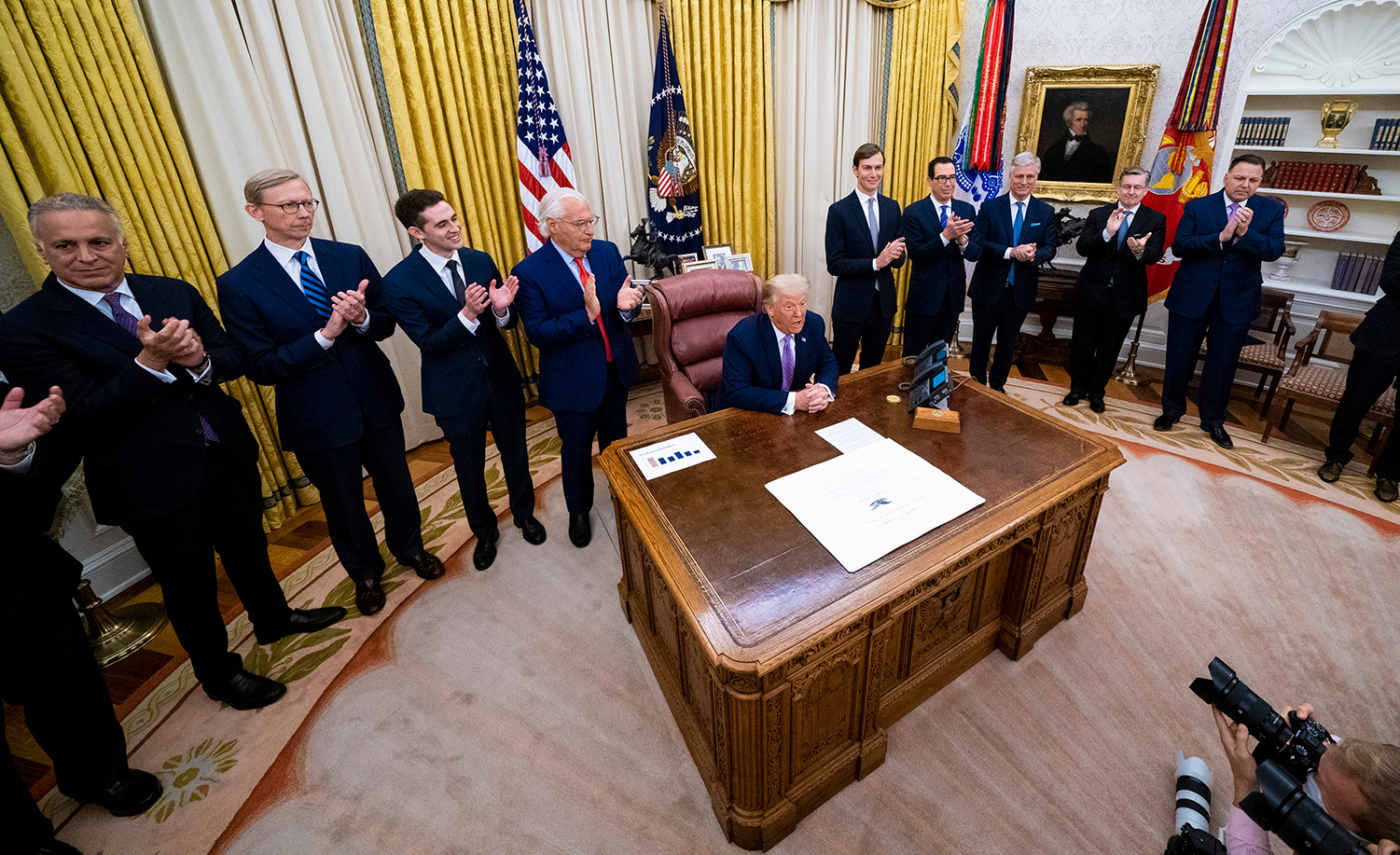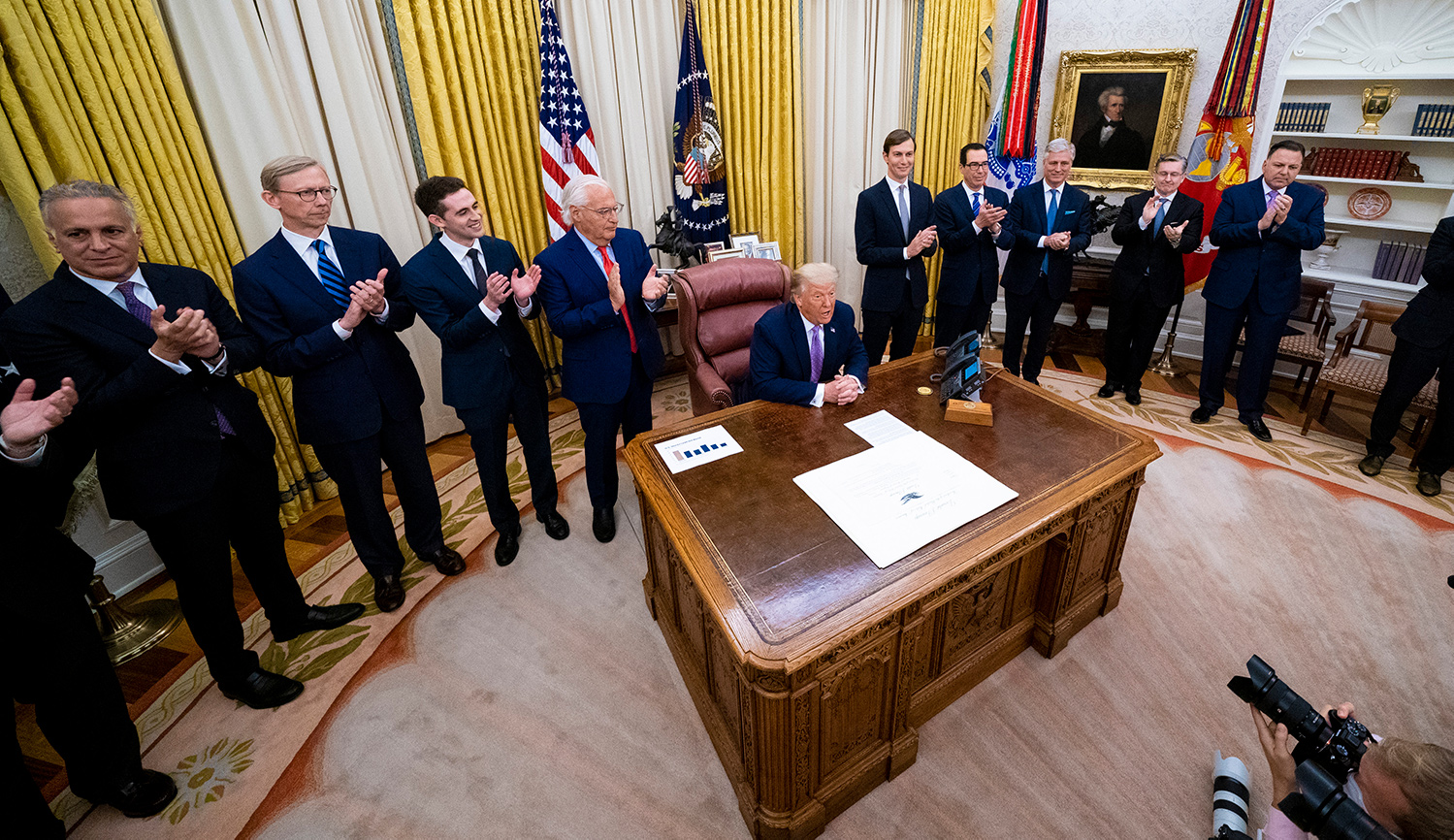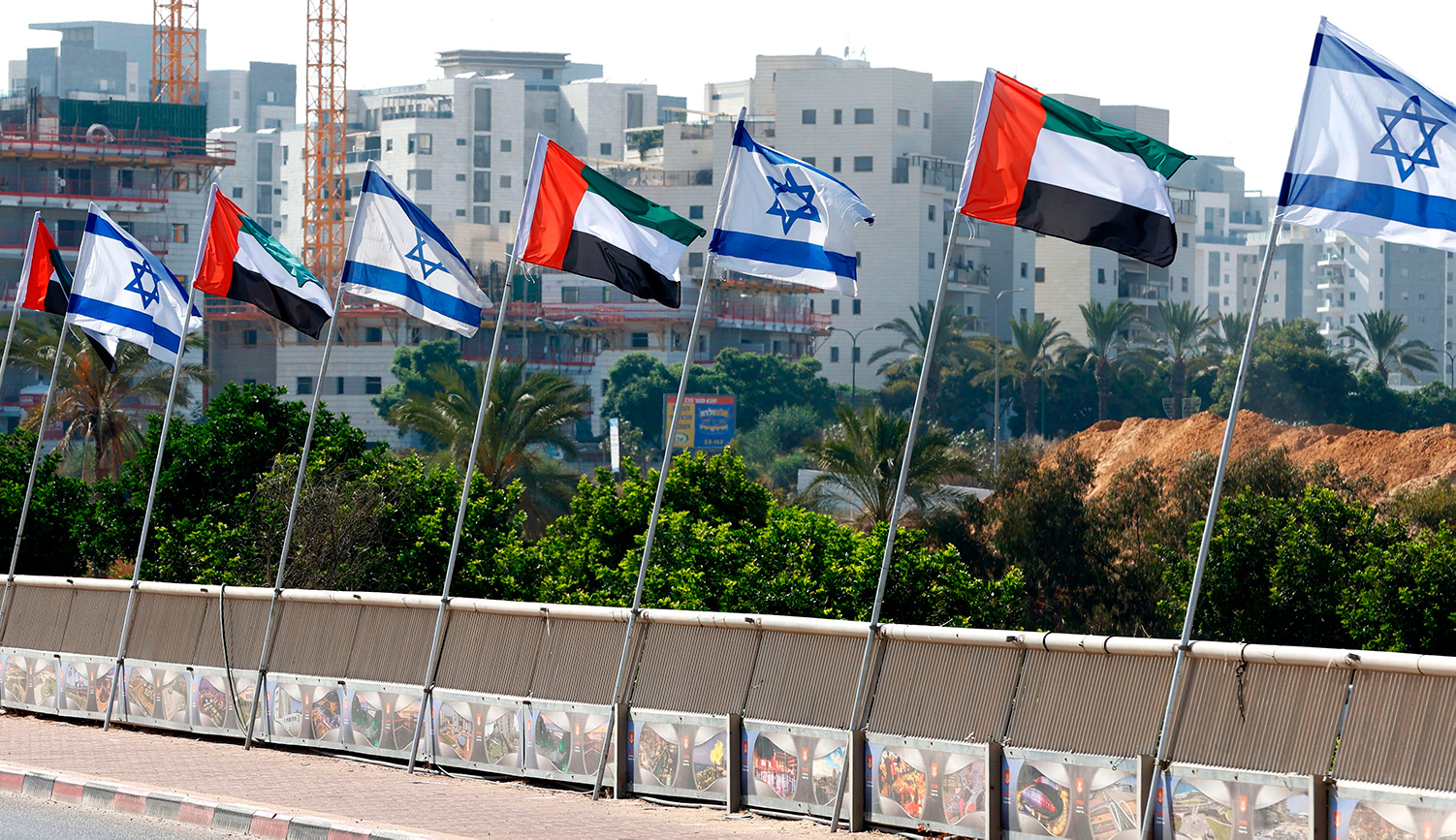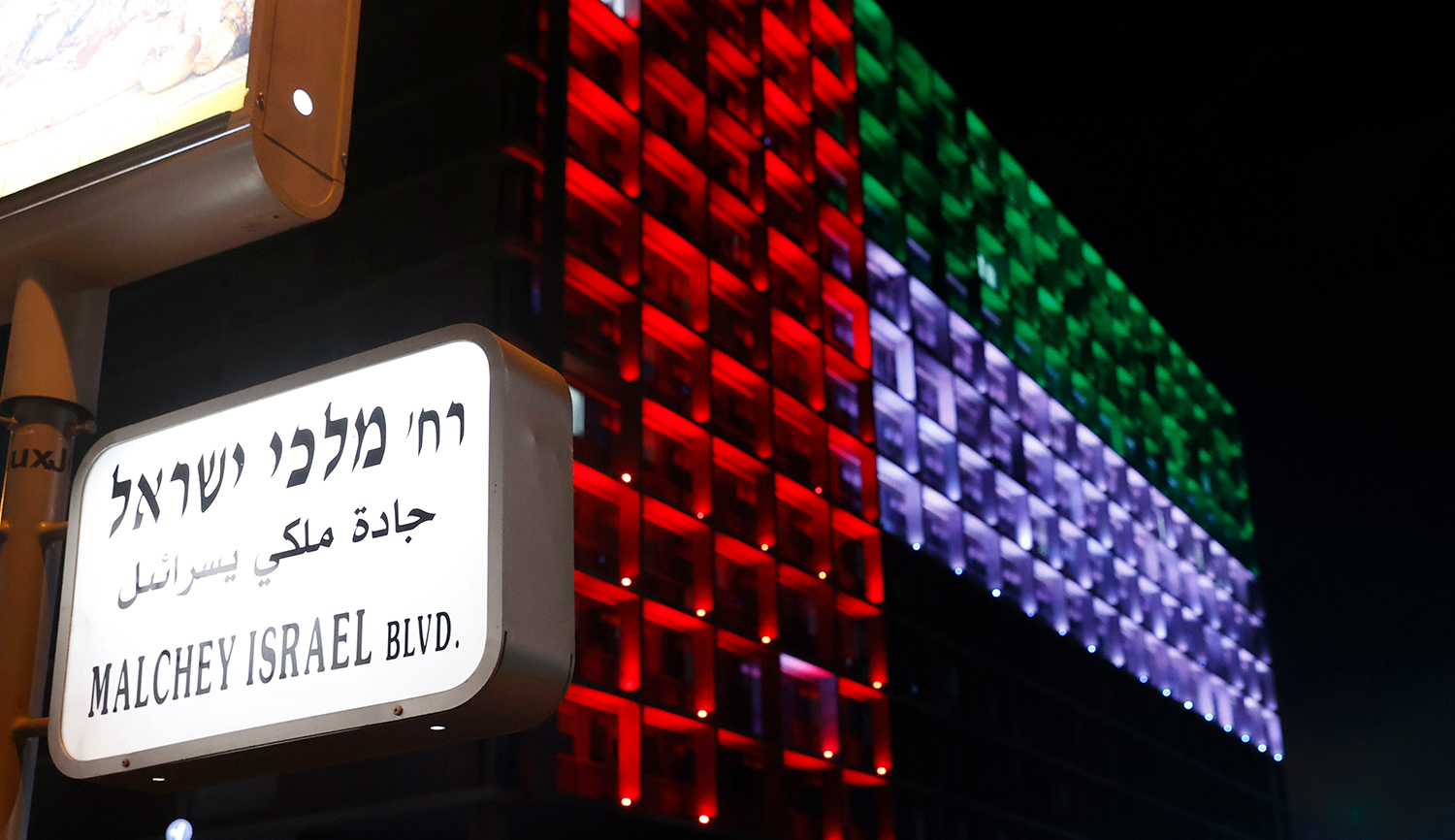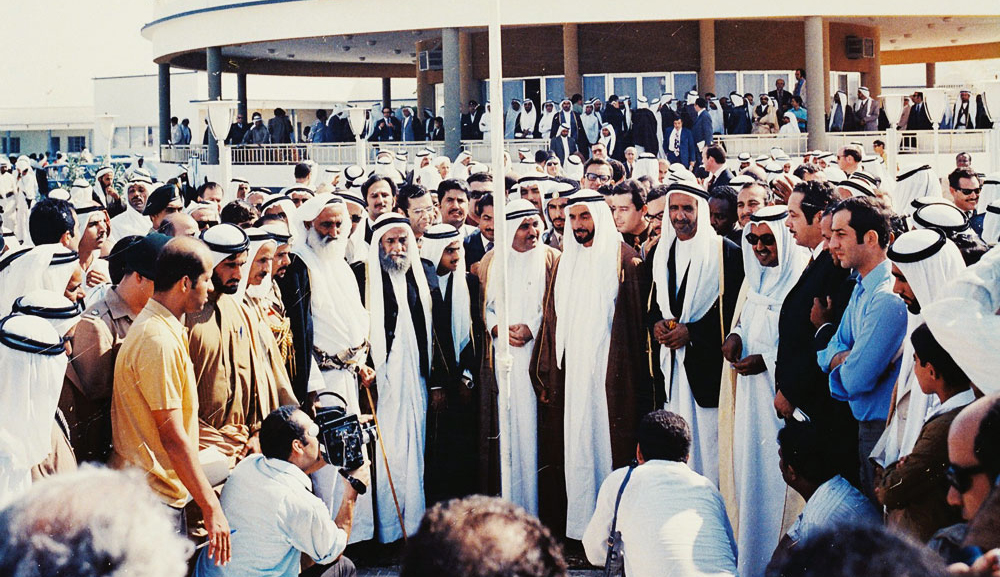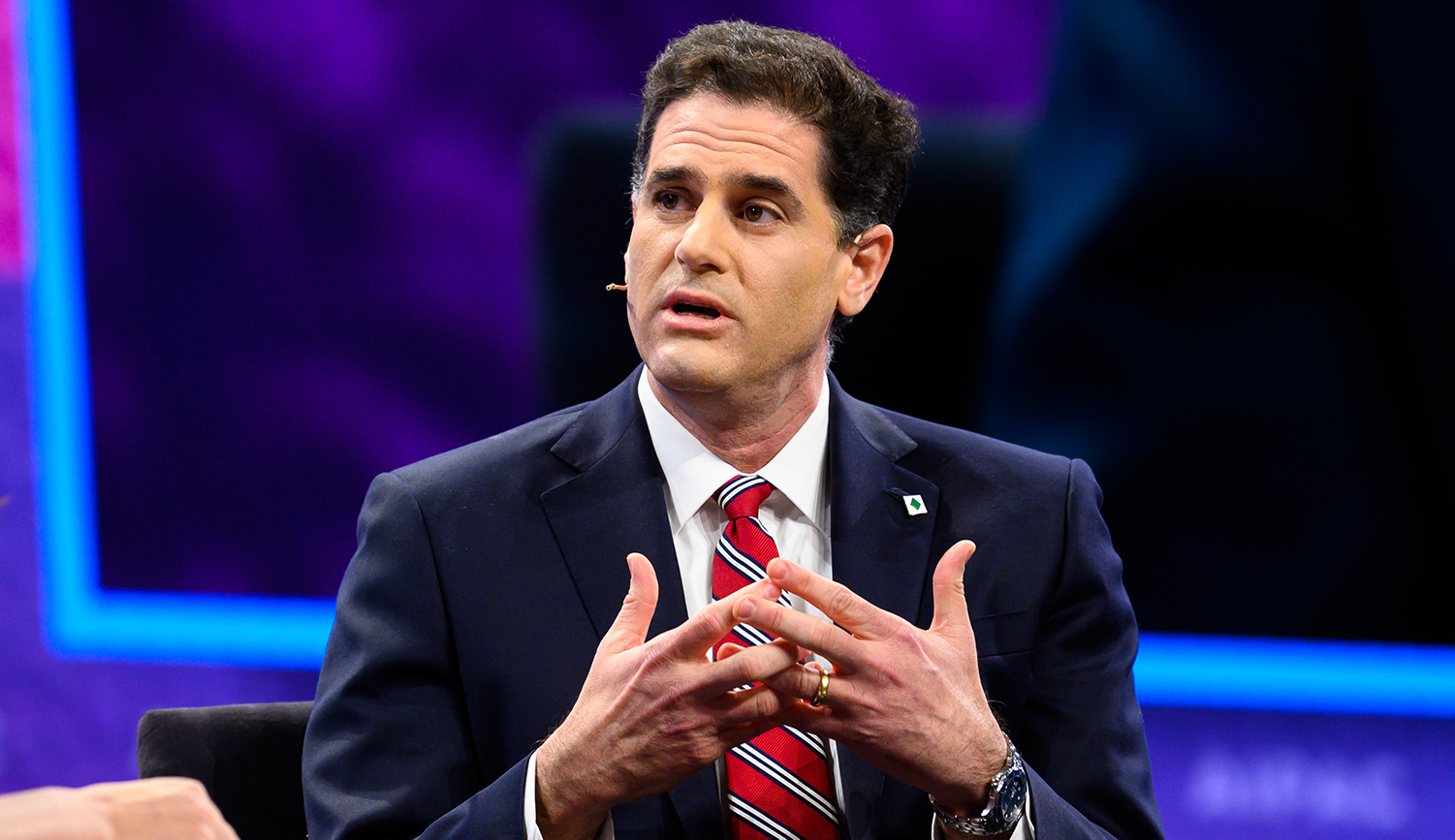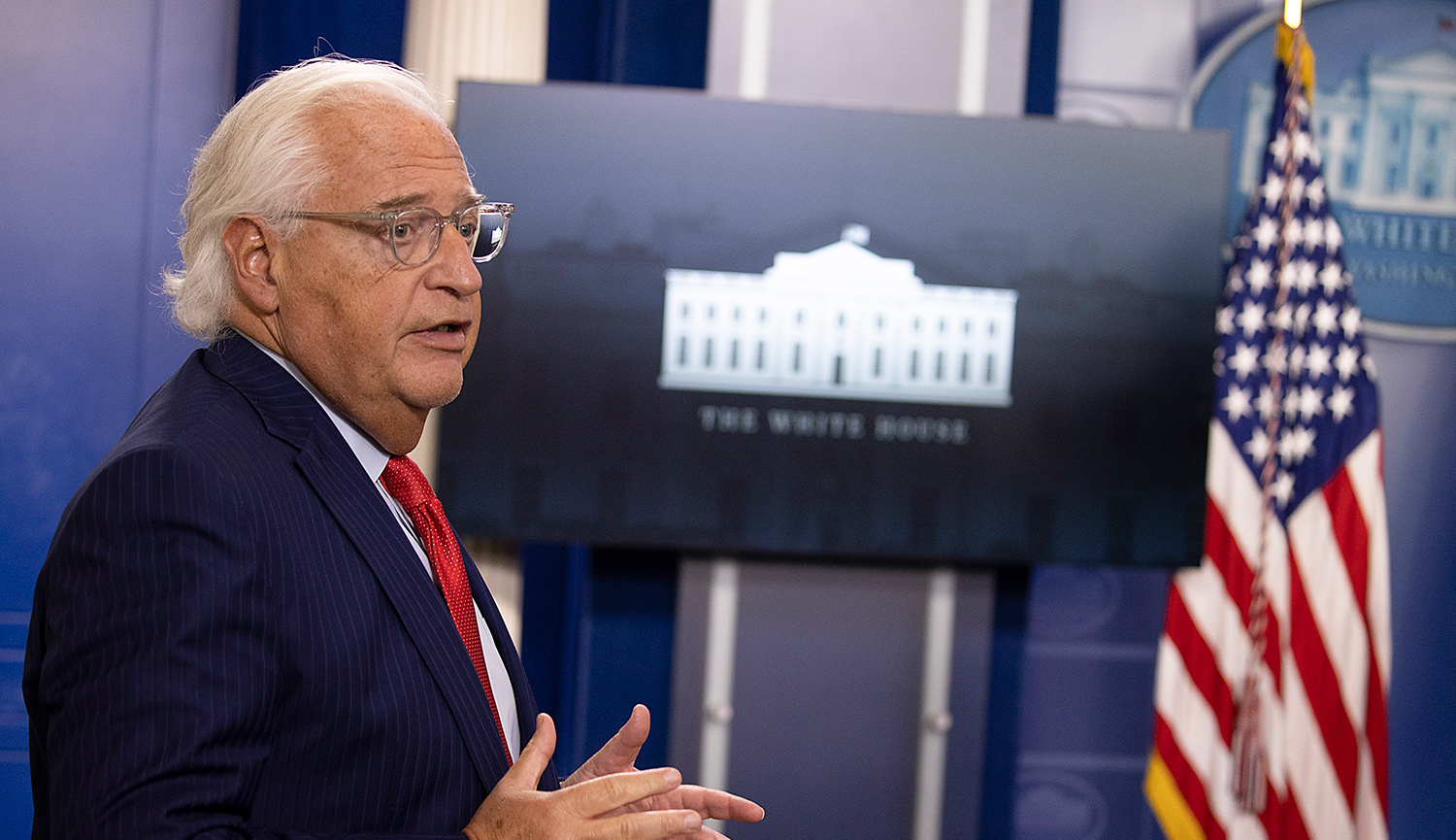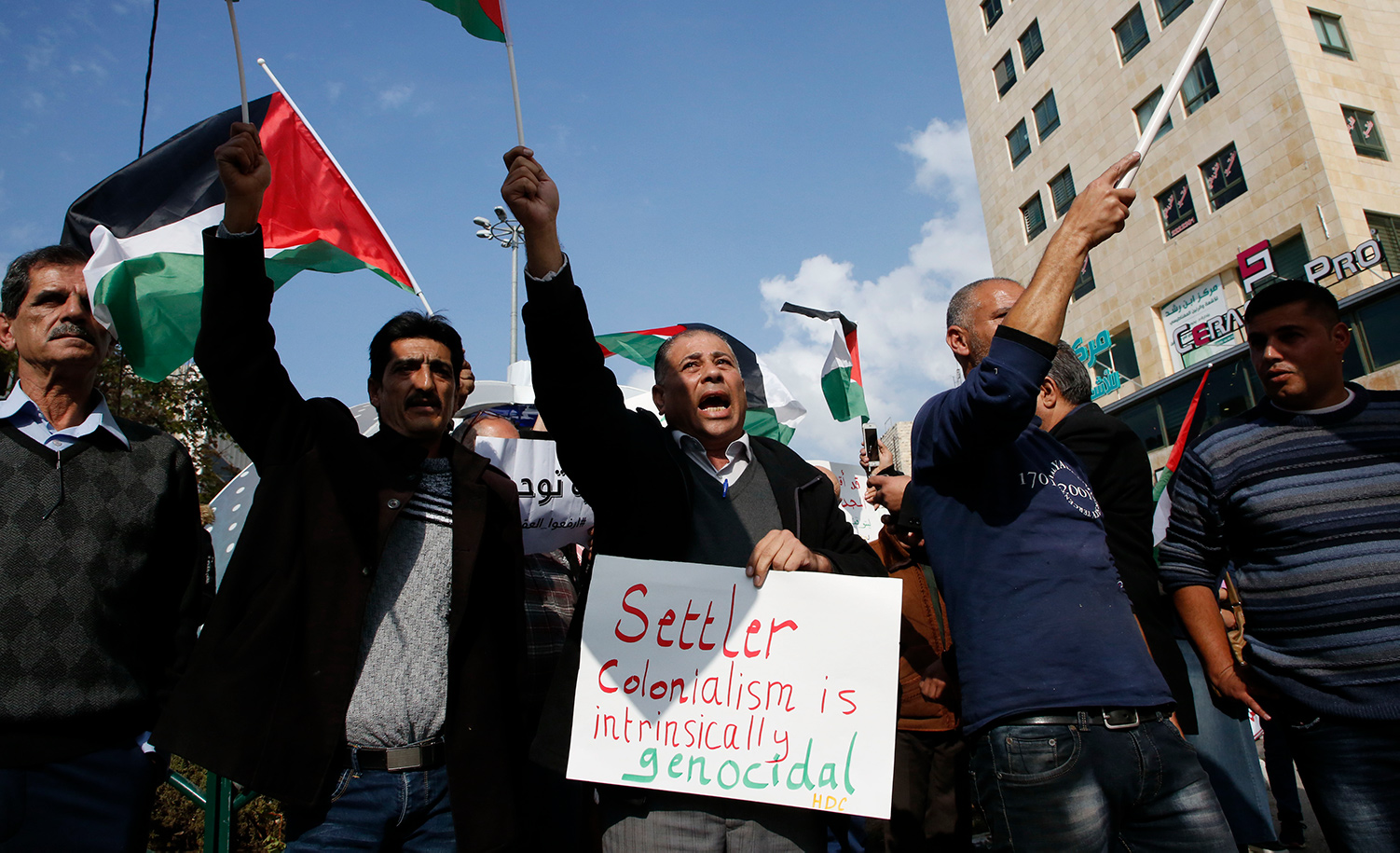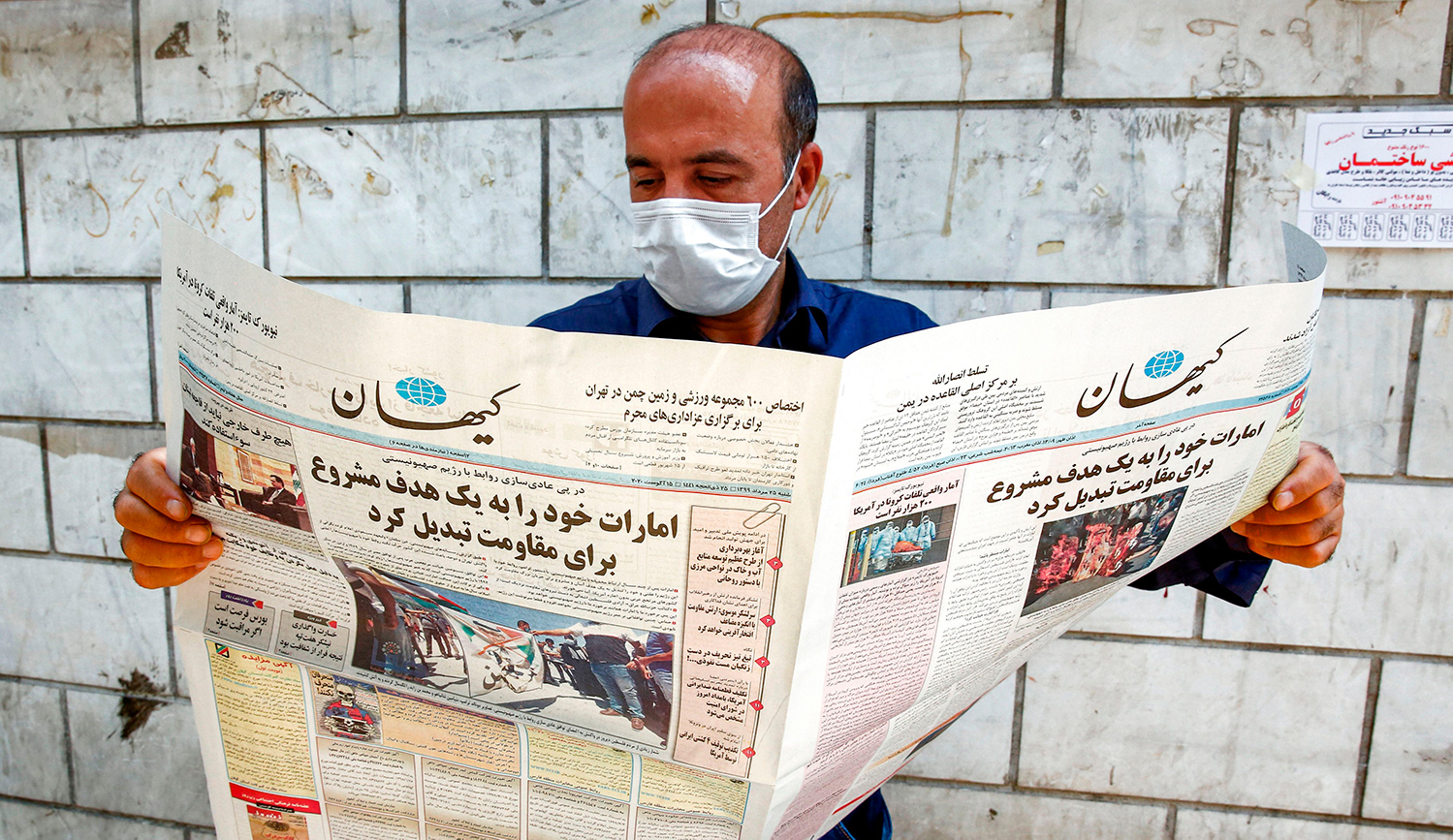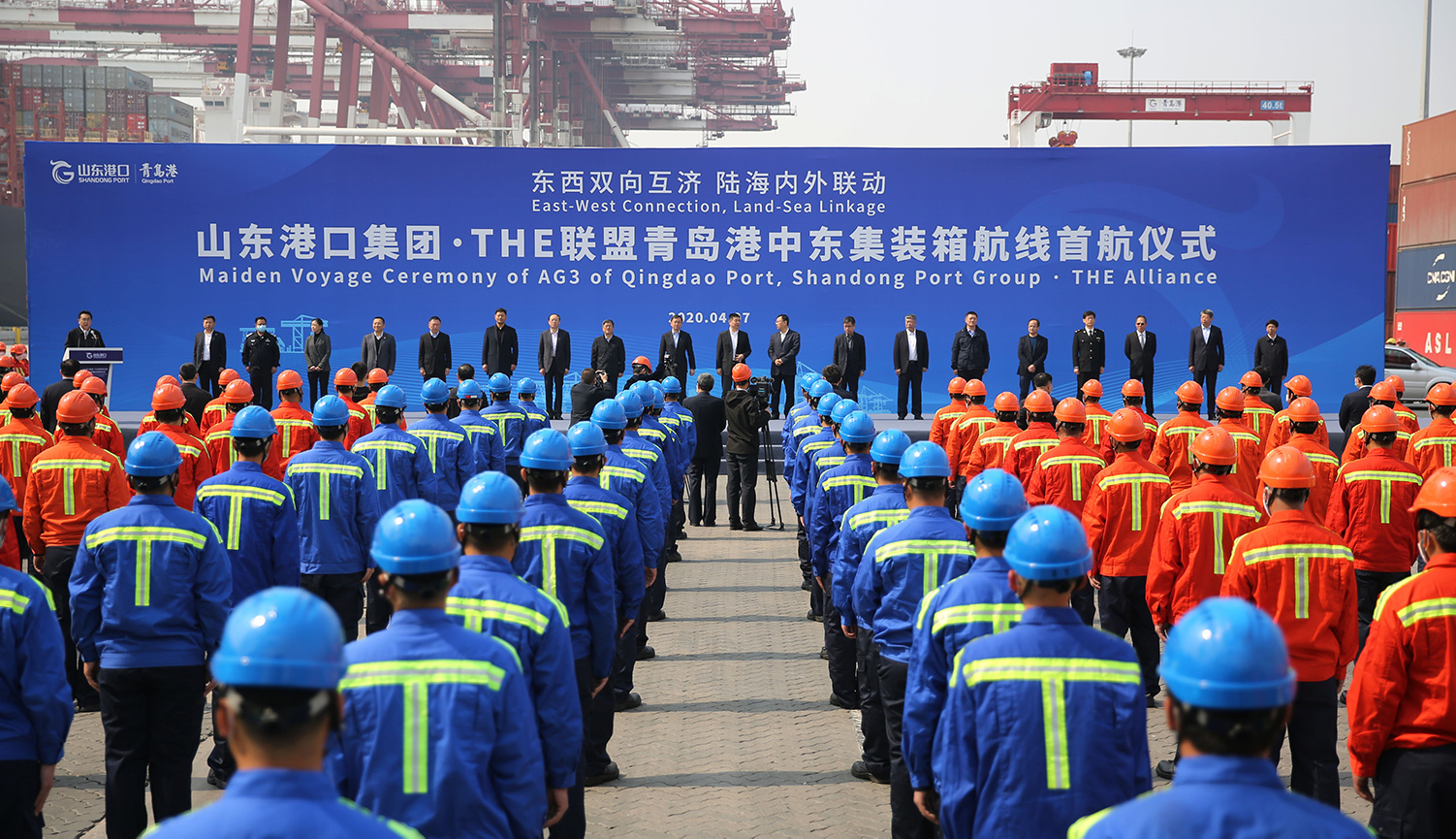This Week’s Guest: Jared Kushner
Though substantial progress is rarely made, peace in the Middle East is the holy grail of every American presidential administration and the subject of endless analysis and discussion. The amount of time and effort that government officials, foreign-policy experts, and diplomats have put into solving the conflict between Israel and her Arab neighbors is probably incalculable. But this month, the United States managed to help them achieve a breakthrough, brokering what’s being called the Abraham Accord between Israel and the United Arab Emirates.
The path to this accord was not conventional. One of the key administration officials who led this effort, Jared Kushner, drew on his experience in the private sector, and reevaluated the interests and alliances of the region. Until five years ago, Kushner had little political experience, but his team achieved something that has confounded peace-process professionals for decades.
In this podcast, Kushner joins Mosaic’s Jonathan Silver for a conversation about how the deal came to be, about how he thinks about America’s role in the Middle East, and about the administration’s approach to diplomacy in the region. Covering everything from the relationship between the Gulf states and the Jewish state to China’s growing role in the Middle East to the president’s unconventional approach, this conversation offers a rare look behind the scenes of American diplomacy in the Trump era.
Musical selections in this podcast are drawn from the Quintet for Clarinet and Strings, op. 31a, composed by Paul Ben-Haim and performed by the ARC Ensemble.
Transcript
This transcript has been edited for clarity.
The Trump administration just helped negotiate the first peace deal between Israel and an Arab state in decades. What do you think that you and the president have learned—and what do you understand about the region, about the nature of the conflict, about the people and the leaders of the Middle East, that the experts don’t?
Well, I don’t know if I would say that we know something that they don’t, but when the president asked me to work on the Middle East and to try to figure out how to bring the region forward, I approached it like I would anything else: we went to the region, we met with all the different players, and we listened. And I think that that was really the most important thing to do. Try to, instead of telling people how things should be, really try to understand their perspective. We studied the historical approaches. We tried to understand why things didn’t work in the past. The board became pretty clear to us, and we quickly realized that there were a lot of people who wanted similar things. We thought that the battlefields that diplomacy had been fighting on were just the wrong battlefields and the wrong approaches, and they weren’t going to lead to different outcomes. So we really took a step backwards and we charted a new course. A lot of it was moving some of the big tectonic plates around, about rebuilding trust, rebuilding relationships.
Keep in mind that in Israel, they were very distrustful of the past administration. They obviously hated the Iran deal. And if you think about what happened in the region at the time, over the course of eight years, you had the Arab Spring, which led to a lot of chaos and turnover in their neighbors. Syria devolved into civil war. Libya became a mess. Iran became very emboldened. Iran’s proxies became much better financed, thanks to the money that America gave it through the Iran deal. Yemen obviously fell apart as well, so the region really went backwards in a big way. And obviously the biggest one is that Islamic State (IS) was formed in Iraq and it grew tremendously. When President Trump came in, it had a caliphate the size of Ohio; it was beheading journalists and looking to plot terror attacks on the U.S. from within the caliphate.
President Trump came in and tried to corral everyone around common objectives. The first trip was to Saudi Arabia, where he got together the leaders of the 54 Muslim and Arab countries and laid out his clear priorities for the region. Where a lot of people always said, “Let’s focus on the Israeli-Palestinian conflict first,” he said, “The first issue is Iran.” Right? For as long as they’re chanting, “death to America” and “death to Israel,” and they’re funding their proxies and all the instability, the region will never get to a new paradigm. The next topic was obviously IS. And he said, “Look, we have to all come together to defeat ISIS.” The third topic, which is very critical, was countering the extremist ideology, as well as the funding that was going to terrorism. That was something that a lot of administrations ignored. They didn’t want to insult people, so they would allow people to play in the gray.
We launched two centers in Saudi Arabia on that trip. The first one was the Counter-Terror Finance Center, which has led to a lot less money going to terror groups—it’s dried up tremendously. The second one was to fight extremist ideology, and we launched in Saudi Arabia, the custodian of the two holy Islamic sites, the Counter Extremism Center, where they really attack negative online content and push out a much more positive and realistic view of the Muslim religion. That was critical.
And then finally he came to the Israeli-Palestinian issue. But the president said, “We need to try new things and approach it in different ways.” That really set the table, and then the president went from there to Israel and then from Israel to Rome to meet with the pope. By doing that, he wanted to really signify that this is a clash where people have used differences between religions as points for division, and we need to bring the three faiths together to focus on how we can really make progress instead.
I think that that was the start. And then over the years, President Trump rebuilt a lot of the trust with Israel. Obviously, we recognized Jerusalem as the capital and moved our embassy. We also recognized the Golan Heights. President Trump moved the embassy A: because it was the right thing to do, and B: because he promised. But what we ended up getting for it was the trust of the Israeli people and the Israeli politicians. He also showed people in the region that when he gives his word on something, he’s going to keep it. So obviously, throughout the region, he’s done a lot to stand with America’s allies.
We rebuilt the relationships. And then after we did that, we started to bring people together and refocus the discussion. We tried to change the paradigm of how people viewed the objectives in the Middle East, to show that there was much more alignment. Instead of using the historical context, we started shifting it around common interests. Most people want to live better lives. For people in the Middle East, everyone’s got cell phones today, and on the cell phones you can see videos of how people in other places live, so the myths and the division that people have used for so long to divide is less easy to do today, because people see that they can live better lives. And that’s what the younger generation wants.
Whether you’re in Israel, or you’re in Egypt, or you’re in Syria, young people want the opportunity to have a job and to deliver a better life. Parents want their kids to live better than them. But in order to have that, you need to have security. Attacking the people who are trying to distort the Islamic faith, to push for extremism, and then creating a security apparatus where there could be an environment for economic opportunity to flourish, that’s a critical commonality.
What we’ve done then is created a coalition of the pragmatic and a coalition of those pushing for moderation and progress. Bringing them together was a natural evolution. The Israeli-Palestinian issue we worked very hard on for years. We worked largely with Israel—obviously the Palestinians chose not to talk with us after the embassy move, but we’d gotten out of them all that we needed at that point. We put forth President Trump’s vision for peace and prosperity, laying out 180 pages of detail about what we thought a good solution, a technical solution, could be for the conflict. When I used to do business deals, what I find is that it’s very easy to agree or disagree on concepts, but you can only solve complex problems in the details. That was how we got through criminal-justice reform, and that’s how we got through the Mexico-Canada trade deal. You had to get into the details and solve it there. We were able to get an opening offer on the table that Israel agreed to negotiate on the basis of, and a lot of European and Middle Eastern countries said it was a great basis, but the Palestinians rejected it before even seeing it. But that showed a lot of people in the Middle East that Israel actually was serious. If we were willing to have a pragmatic plan and if we were going to protect their security, then that would be something that they would go forward with. And it was also about making the lives of Palestinian people better. That was something that we laid the groundwork for, whether it was at the Warsaw conference or the Bahrain conference, where we brought Israeli and Arab partners closer together. And all of this led to the culmination of getting Israel and the United Arab Emirates to take this big step, which led to the first peace agreement in the last 26 years in the region, which really was a historic breakthrough.
Let’s return to the question of trust, which I found interesting too. It’s amazing how few people knew what was happening. And even until it was announced, how few people were really involved. And the few people that were involved in putting this together really had to develop trust in one another. So I just ask you, how did you go about building that trust with key figures, particularly in the Arab world, over the last few years?
Mostly by going and listening, and then having them see that our meetings never got out to the press, that nothing ever leaked. I don’t talk to the press very often. And so, that builds trust. When you want to talk about things that are uncomfortable, people need to know that they can show vulnerability and brainstorm ideas that may be unconventional without having the blowback. If you look at Israeli-Palestinian issues, the deals always die when there’s a leak to the press. And then what happens is everyone has to run back into their corner to deal with their domestic politics. So the trust that we built was really instrumental. It’s funny, because over the years, there were a lot of negative press stories about me, where you would have diplomats who were excluded from meetings, who would then go to the press and complain that I kept them out of meetings. But obviously the reason I kept these people out of the meetings was because they were the type of people who were going to run to the press and say something
I worked with the national security advisor and said, “Look, I want to make sure I have the right staffing for this so that I’m keeping with all the protocols, but I really need to hand-select the people who are going to be working with me and be on my team and be in those meetings so that my counterparts can feel comfortable knowing that the information we’re exchanging always stays between us.” And so we were able to do a truncated process. One other thing I’ll say is that the peace process always leaks. It’s just something historically; details always leak one way or the other. But we kept our document—which was a very substantial document—fully confidential, and nothing ever leaked out to the press. I joke that one of the ways we did that is we didn’t classify the document. We just kept it as a regular document between us. Because it wasn’t in the system, we controlled it and we wrote it and we worked with it and we did it that way. We were able to keep things from getting out. I think that when you’re trying to get people to do things that are uncomfortable and they have domestic constituencies that may not be ready for big dramatic changes, when there’s antibodies that will try to fight progress, secrecy and controlling the narrative and controlling the message is essential.
It strikes me that thinking about the last few years, surely there have been opportunities along the way for you and the administration to gain political advantage at home, by, say, speaking out more forcefully against human-rights abuses or other things you may not have liked, but that you may have refrained from doing in order to build the trust, building towards some larger vision of the Middle East.
Yeah. The president’s view is that he’s not looking to be in the lecturing business, he’s in the results business. And when you think about a lot of these countries, if you have the ability to make an impact privately by conveying your thoughts and hopefully asking people to make progress on different issues, you’ll get a lot more. You only lecture when there’s nothing you can actually do. You do it sometimes as a tactic. But for example, I think the president’s gotten over 50 hostages released, which is, I think, more than any president during the same duration. That’s because he’s built strong relations with a lot of the places where people are hostages. And so he’s been able to use the goodwill that he has, not by getting up and giving a speech that will earn him favor at home, but by doing what it takes to keep people safe. He’s pragmatic.
I think that what we’ve done is, when we have things we don’t agree with, or things we’d like to see changed, we’re very strong in our discussions with our friends. And we can be very frank because again, we’re not politicians, we’re not reading cue cards and talking in diplomatic speak. We speak very plainly and we speak very firmly. With the president, you know where he stands, and he’s not going to go and try to showboat and lecture people for the sake of lecturing people. He’s about achieving results, and he’s always thinking: “What’s in America’s best interests?” We’re not going to agree with every country on everything, but we have to find our areas of common interest, and pursue those.
In areas where we disagree, let’s try not to let that hinder our ability to make progress on the areas where we can benefit our citizens, our security, and our economic prosperity for Americans by jointly pursuing that. And each country determines, one way or the other, who its leader is. It’s not our job to pick who’s running a country, but it’s our job to build that relationship and work collectively to determine what are our common interests, what do we want to accomplish, and how do we get there? And that’s what we’ve done.
In order for the Emiratis to agree to this accord, the Israelis agreed to suspend annexation in the West Bank. What do you think it will take for the Saudis to bring their security and intelligence cooperation with Israel above board and for Israel and Saudi Arabia to come to a similar kind of bilateral official relationship?
Well, Israel made the right decision, right? Prime Minister Netanyahu put the interests of Israel above any one political bloc. And he did something that will make Israel—long term—much more safe, much more accepted in the global community. And I do believe that this move will lead to peace with other countries and eventually peace with the Palestinians. I think that the areas in Judea and Samaria that we were talking about are areas right now where Israelis live. Israel controls them from a security point of view. And realistically in any final deal, these people are never going to leave those positions. So not applying Israeli law, in my mind, it’s a big concession, but it’s also a small concession. I think that it sets the table for what ultimately could be a proper resolution in a way that makes the whole region go forward in a better way.
With regards to other countries though, I think people have been watching this very closely and seeing that the younger generation in the Muslim world just wants to go forward. They’ve had twenty years now of chaos and instability and lost opportunity. I think that we’re talking about the relations that Israel has with Saudi Arabia now, and, in contrast with three years ago, we’re not whispering anymore. And I believe that it’s an inevitability that all of the countries in that region will come together because they care about their people. And you’ve seen very strong leadership by King Salman and Crown Prince Mohammad bin Salman to modernize their society. They’ve restricted the religious police; they’ve given a lot more rights to women. They’ve allowed them to drive. They’ve restricted the guardianship rules. They’ve really gone after a lot of the imams in the mosques who were really radicalizing youth, and they’ve cut down tremendously on the amount of funding that was going to terror groups.
We have a joint interest with them as Americans and Israel has that joint interest as well, to push to combat terrorism, to have a more stable region, to push back on Iran’s aggression. And they’re doing it because it’s better for the Saudi people. It’s better for the region. And Israel does what it does because it’s better for Israel and better for the Israelis. So, the president likes to find win-win deals where people are doing things because it’s in their interest to do it. He just finds common areas of interest and that’s where you can create the most progress. So I do think it’s an inevitability at this point, especially because of this breakthrough, but whether it will happen in the short term, medium term, or long term is really going to be up to the leadership. It’s going to be up to a different set of circumstances that will arise.
But I think that, again, the big wildcard in the region now is Iran. It’s lost a tremendous amount of influence over the last few years. And everywhere the Iranians are in the Middle East, it’s a mess. They’ve had a stronghold in Lebanon, which is basically a failed state now. They destabilized Yemen. Syria—they’re there, not helping make it better. And Iraq is now rejecting Iran and pushing it out because Iraq wants to be for Iraq and doesn’t want to be a vassal state of Iran. So I think that Iran is being very much constrained both financially and regionally. Hopefully it will make the right decision, which is to stop this foreign policy of trying to destabilize the region. Let’s stop trying to expand, let’s just focus on our country, focus on our wellbeing, stop making the whole rallying cry around death to America, death to Israel. And I think that if they focus on that, the whole region could come together in a much more substantial way, and there’ll be absolutely incredible potential there.
You could say that the Middle East is starting to be seen as an arena where a proxy conflict is beginning to take shape between America and the American-led order and China. I’m thinking about Belt and Road investments in the extraction and movement of oil, infrastructure investments throughout the region, the construction of commercial ports, large cash investments in various places. How do you see this deal in relation to that?
If you think about the macro conflict in the world right now, it is the liberal democracies against countries that are using capitalism against liberal democracy. World War II was really liberalism against fascism and then liberalism won. And then, in the eighties you had liberalism against Communism and liberalism won. But you had a reconstitution of some of these more authoritarian governments, where they’ve used democratic means, or some form of faux democracy, to cloak their ability to have more a state-controlled system, by controlling the economy or tightly controlling their populations. And that is a clash.
Now in the Middle East—with the exception of Israel, which is the only true democracy there—you have a lot more monarchies. And I guess that leads to a system that has to think more long term than perhaps the democracies that we deal with and that Europe deals with mostly. So I do think there is a conflict in that regard. I think that these countries, long term, want to be with America. But I think that, unfortunately, if you think about what happened in the last administration, many of these countries felt very betrayed by America. One of the leaders said to me, “We’ve been with America for 30 years, for 40 years. And then all of a sudden America asks us to put on all these sanctions on Iran and then behind our back America goes to Persia, and they make a deal and that’s a massive betrayal.” So that led to a lot of our traditional allies turning to China and thinking about how to form a stronger relationship with Beijing.
Russia also has a longer-term governance structure in place right now too. And they built strongholds with Turkey and obviously they deal with Iran and they’ve made inroads there, whereas Russia and Saudi Arabia used to be at loggerheads for many years. Obviously you had the war in Afghanistan where they were on different sides and there’s other history there. Now they’re working together and that’s been, I think, productive for the global oil market. Actually President Trump was able to negotiate a deal with King Salman and President Putin, which I worked with him on, to get the largest cut in history for oil prices. And that was when obviously the big depression hit, thanks to COVID-19.
It’s definitely a middle world right now, but I think that these countries would prefer to be with America and they want a more empowered way of life. I think they look at it and say, “We’ve almost lost a decade and a half.” And if they think about between 2001 and today, China’s become a behemoth by having a very well executed, state-run capitalist system. And these countries have been stuck in a quagmire because of all the wars and the infighting and the conflicts. So they’re waking up now. If you go through history, you have thousands of years of pendulum swinging, but all countries are learning and evolving. I believe that the countries in the Middle East are looking for a brighter future and I believe that the Abraham Accords, this breakthrough that we were able to make between Israel and the UAE, is a very strong signal to the region and to the world that we don’t want to allow the conflicts of the past to hold us back from seizing the opportunities of a very bright future.
That’s what our Bahrain conference was about. We basically laid out a $50 billion plan where, we believe for the Palestinians, we could double their GDP, create a million new jobs, decrease their poverty rate by 50 percent. We built the whole business plan. And actually it’s not even that hard because it’s just five million people and they have a lot of natural advantages. But you can’t want people to achieve prosperity more than they want to do it themselves. The thing that was inhibiting all the investors from going into the West Bank and Gaza was not Israel; it was the fact that there’s not a strong system of governance. There’s not a judicial system where they can feel comfortable making investments. And there’s not a security regime where they feel comfortable making long-term capital investments. So, if people want to create jobs and they want to have better lives, you need to create the environment to do that.
President Trump’s critics and admirers I think both agree that America’s never quite had a president like him—they both see him as operating in an unorthodox way. That makes me wonder if policy innovation and political breakthrough require leadership that’s just not formed by the inherited codes of behavior.
I think he has courage because he has courage. He has lived a life where he hasn’t always played it safe. He’s succeeded, he’s failed. He’s been through ups, he’s been through downs, and he has a lot of world experience. He’s been through deals; he’s run companies. And so his tolerance for disruption is probably much greater than a lot of career politicians whose whole goal in life has been to not screw up. I find in Washington that you’ve got a lot of people who are very good analysts, who can tell you why a something is wrong and why the status quo is no good. But in order to change the status quo, you need to try to make something better. In Washington, when you try to put something in play—which you have to do—you have to take some degree of risk in order to make something better. Everyone gets very nervous about taking any risk and they all freak out about what the downside is going to be. And it becomes paralyzing to making any progress. The president is willing to eliminate the status quo because once you’ve done that, then people will change and they’ll move. And they will inevitably, especially when you try to mitigate the downside and do everything you can to lubricate the upside. One of my favorite quotes is that change is like heaven. Everybody wants to go there, but nobody wants to die. You hear a lot of people complaining all the time about all the things he’s doing, but what he’s really doing is he’s pushing people towards progress, and you think about the results. Again, I find that with President Trump, you really have to judge him by the accomplishments. And the metabolism of the federal government, since he’s been here, has been extraordinary.
I define his ideology as that he’s a common-sense president; he’s pragmatic, and he’s flexible. And I see that as an asset. I think he’s very good at keeping people on their toes and furthering America’s objectives. Obviously we’re talking about the Middle East today. Most presidents saved the Middle East for their second term because it’s so impossible. And at the end of their second term, when they’ve lost all their capital in Congress and they’ve run out of things to do at home, they say, “Hey, let’s get involved in the Middle East because maybe I can solve the unsolvable whale and that will help me with the legacy.” President Trump took it on from day one because he wasn’t afraid to fail.
There’s an understanding out there in the American Jewish community—I’m sure you’re aware—that President Trump is, if not anti-Semitic himself, that he’s put the wind in the sails of anti-Semites. On the other hand, if you look at how he’s strengthened religious freedom in America through judicial appointments, and strengthened the U.S.-Israel relationship, he’s arguably one of the friendliest presidents to the American Jewish community. Why do you think there’s such a divergence of views of your administration among America’s Jews?
Again, I was not that involved in politics before I got involved in the campaign, but what I’ve come to realize as somebody who was living and operating in a fairly liberal world, is that one of the things that the liberal group think does is use terms like anti-Semitism and racism way too liberally. They throw those terms around whenever they don’t like somebody. And so unfortunately, there are cases of anti-Semitism and there are cases of racism in this country. But when you overuse those phrases, they lose their meaning for the times when it’s real. And so I just think that people have thrown those definitions at the president without cause. And I just say, judge him by his actions and look at what he’s done.
The president’s been incredibly strong on anti-Semitism. He issued a strong executive order to fight anti-Semitism on college campuses, which was very, very impactful. He obviously has been very, very pro-Israel. He’s been unashamed with what he’s done and what he’s fought for with religious freedom. So I just feel like people make wild accusations, but it’s really to pry at people, to try to make an emotional argument, whereas President Trump’s love language is his action and what he does. So you have to look at the way that he operates and the results that he brings. And at the end of the day, it’s very hard to find any action he’s taken that’s anti-Semitic.
If you want to make the argument about his actions to show that he’s done a great job for the Jewish people, that he’s done a great job for Christians and that he’s done a good job for minorities, the list of actual actions that he’s taken is quite long. We’re in some ways in a post-truth world and people are in their different echo chambers and they believe more what they want to believe. But I think it’s all of our obligation to try to see the other side. Again, for me, my beliefs now are based on really listening to people of all sides. I was not deep on a lot of the political issues that I’ve been dealing with for the last years. But if you talk to people and you explore and you see everyone’s opinion, then you can form a reason-based view. But President Trump is a person of action and he’s had a real action-oriented administration.
We’re here talking about the Middle East today. A lot of the steps he took were unconventional. They were ones that the career Washington folks thought were wrong. He took a lot of criticism along the way, but he also produced a result that nobody thought he would achieve and that nobody else could achieve. So I just find that, time and time again, you have the Washington way of thinking. But the Trump presidency is not about left versus right. It’s about inside versus outside. And particularly with the Middle East, he set the table for people to think about things differently. And there’s a tremendous amount of opportunity for what more good can come.
More about: Israel & Zionism, Israel-UAE Peace Agreement, Middle East, United Arab Emirates
